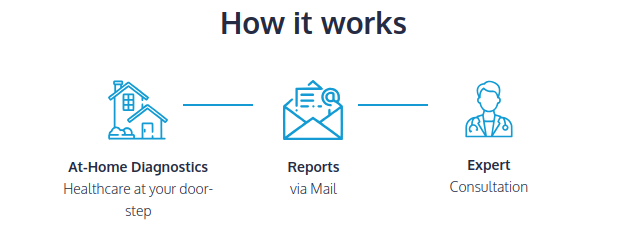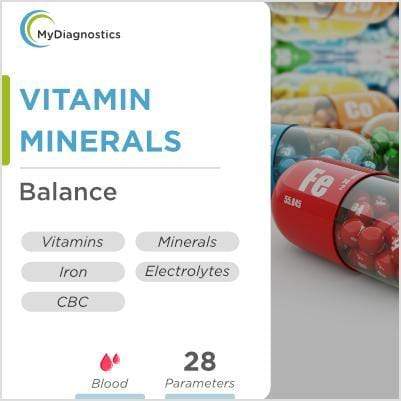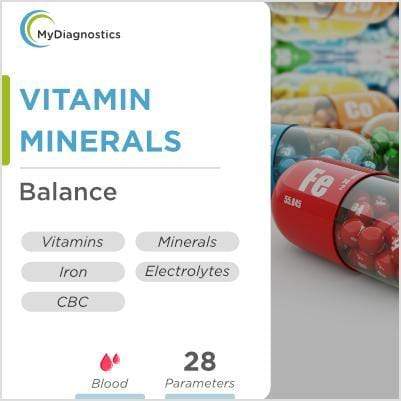Vitamin, Iron & Mineral Balance - Vitamin Blood Test, Iron & Minerals
Test Parameters


It is essential to keep vitamins iron and essential minerals balanced for achieving healthy life and well-being. The body requires these nutrients to function properly for energy production and immune response as well as maintaining cognitive functions within the nervous system and supporting proper bone development. A health condition that leads to serious problems arises from being either deficient or having too much of these substances.
Early detection of nutritional deficiencies is possible through periodic vitamin testing in the blood combined with tests for iron and mineral levels to enable necessary dietary changes and supplementation at the appropriate time. Both professional medical supervision and a varied nutrient-consuming diet help people maintain their best health. People who concentrate on having proper nutrient balance will experience better health performance and prevent long-term medical problems.
About the Vitamins, Iron and Mineral Deficiency Test
Medical diagnosis and preventative care for nutrient-based health problems require vitamin iron and mineral deficiency tests. Blood tests identify deficits which result in fatigue together with weakened immunity impaired cognitive processes and additional health problems. The detection of health issues at an early stage through blood tests enables prompt treatment decisions to take place including diet changes together with supplementation or medical intervention.
The testing process should be repeated at regular intervals by people who face increased risk factors including those following special diets or facing health conditions or malabsorption issues. Regular monitoring of nutrient levels gives people the chance to take immediate action to achieve a well-balanced diet and maintain healthy overall status. Following a balanced diet to maintain proper blood levels of vitamins, iron and minerals will both enhance long-term health and reduce the probability of life-threatening deficiencies.
Common Symptoms of Nutrient Deficiency
-
Dysfunction of the blood system occurs when someone does not have enough iron vitamin B12 or folate which results in chronic tiredness and muscular weakness.
-
It is possible for biotin iron and zinc and vitamin D deficiencies to produce thin hair along with brittle nails that are weak in texture.
-
Dry and pale or flaky skin develops when a person does not have enough iron vitamin C or essential fatty acids.
-
The healing of wounds and prevention of frequent colds becomes slower when you have insufficient vitamin D, vitamin C, and zinc in your body.
-
Muscle cramps together with joint pain and weak bones are effects of deficient calcium, magnesium and vitamin D.
-
A deficient amount of iron along with omega-3 fatty acids and B vitamins changes mental functioning while causing memory loss together with problems concentrating.
-
Poor vitamin B12 and magnesium levels will lead to hand-foot symptoms comprising tingling and numbness sensations.
Nutrient Deficiency & Immune Function
Mild discounts in essential nutrients will cause substantial damage to immune system strength which leads to poor resistance against infections and delayed recovery times after illnesses. Vitamins C and D together with minerals iron and zinc as well as vitamin A function as essential components for sustaining immune function along with supporting white blood cell creation and strengthening defense systems of the body.
The immune system requires strong nutrients found in a balanced diet to stay healthy. Patients who get routine medical examinations combined with blood tests can discover vitamin/mineral deficiencies promptly which minimizes prolonged medical issues that emerge from these deficiencies. People who maintain proper nutrient levels will achieve stronger immunity and less susceptibility to infections as well as better health results.
The key role of Vitamin D in our body
The body needs vitamin D to sustain overall wellness because the nutrient promotes healthy bones as well as immunity and helps the body absorb calcium. The nutrient helps manage emotions while lowering inflammation and promotes both muscle and cardiovascular functions. People with vitamin D deficiency experience fragile bones together with higher infection rates and develop various permanent health problems.
People should safeguard their essential vitamin D status by obtaining sunlight properly along with food consumption while adding supplements when needed to maintain wellness. Medical examinations together with vitamin D screenings help protect against deficiencies to support both short and long-term health outcomes. The implementation of sufficient vitamin D intake will enable people to maintain robust immune health and support healthy bones while improving their everyday life quality.
Vitamin B12 and its role in forming red blood cells & DNA
The fundamental function of vitamin B12 revolves around red blood cell production and DNA synthesis because this nutrient enables oxygen transport and cellular activity. Not having enough vitamin B12 results in anaemia combined with fatigue together with brain problems while affecting mental performance. Human beings need to acquire vitamin B12 externally through their diet or supplements because the body does not produce it independently.
The preservation of sufficient vitamin B12 amounts stands vital for general wellness especially since it affects people with restricted diets who adopt vegetarian or vegan lifestyles. A combination of proper healthcare checks and intake of vitamin B12 sources between animal products and fortified foods protects against deficiencies while supporting basic cell development and genetic system wellness.






